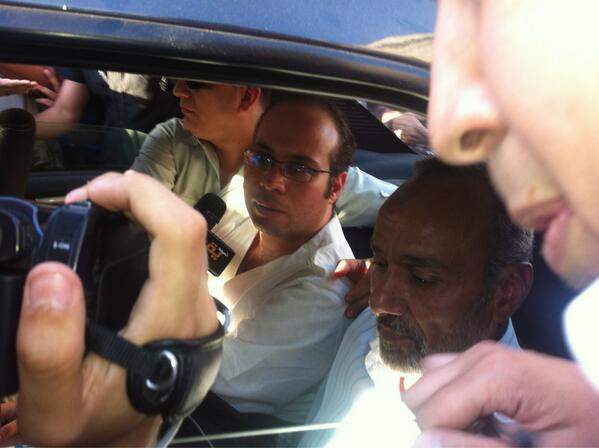This year’s April 6 Mahalla protests spawned human rights violations on a mass scale: between 500 and 600 people were arrested at random and detained in Mahalla’s two police stations. Allegations of mistreatment and torture were made by some of the detainees.
US photojournalist James Buck and his translator Mohamed Marei were among those arrested. Both were held in defiance of a public prosecution office release order. Buck was eventually released 48 hours after his arrest. Marei, however, disappeared – he says he was kept blindfolded in state solitary custody for 19 days – before eventually being released from prison 90 days after his arrest.
The trial in an emergency state security court of 48 men and one woman from Mahalla charged with plotting and instigating the April 6 protests began in late August.
Rights groups condemned the proceedings as a show-trial backed up by scant or fabricated evidence designed to give credibility to the government’s presentation of the events of April 6 as violence orchestrated by criminally-intentioned thugs.
Two of the defendants were released ahead of the court’s pronouncement of the final verdict: one of the two men was released because the court found that his mental disability prevents him from being held criminally responsible. He had spent seven months in prison.
The court eventually found 22 of the defendants guilty and 27 innocent in a heavily criticized verdict regarded as a compromise between the regime and political forces.
Incidents of police brutality were frequent in 2008, facilitated in part by the renewal of the state of emergency (and the broad powers of administrative detention the police enjoy under emergency law) for another two years in May.
In October Mervat Abdel Fattah, who was pregnant at the time of her death, died 10 minutes after she was kicked in the stomach by policemen who had stormed her home.
In the same month shop owner Salah Mohamed Ahmed was taken into custody by police officers in Alexandria. He says that he was tortured by a group of 14 police officers who sodomized him. It later transpired that the officers had got Ahmed confused with another. It was a case of mistaken identity.
Magda Adly, a psychiatrist in the El Nadim Center for the Rehabilitation of the Victims of Violence, was assaulted by a policeman wielding a knife in May while attending the trial of torture victims charged with resisting arrest.
Adly suffered a dislocated shoulder during the assault.
And in November a man was shot dead by an off-duty policeman, allegedly following a street fight between the dead man’s and the policeman’s brothers.
Amnesty International condemned Egypt’s “pattern of reckless policing in a statement issued in November.
The statement condemned the “increasing use of excessive force by police and security forces and made reference to the fatal shootings of African migrants attempting to cross the Israeli-Egyptian border which became a regular occurrence in 2008.
Fingers were pointed at the police following several incidents of sectarian violence in 2008, including clashes over land between monks and Bedouin Arabs in Abo Fana, Minya, which left one man dead.
A report on religious freedom issued by the Egyptian Initiative for Personal Rights detailed several incidents where the police response to sectarian clashes was slow and inadequate.
It also suggests that the reliance on “reconciliation sessions rather than the criminal legal process in such incidents encourages further acts of violence.
A series of police arrest campaigns conducted against individuals suspected of being HIV-positive which began in 2007 and continued in 2008 was also condemned by rights groups.
In April nine men, including five HIV-positive men, were sentenced to between one and three years imprisonment following their conviction on charges of “habitual debauchery.
The men allege that they were subjected to torture and ill-treatment (such as forced anal examinations) involving police and medical professionals.
Amnesty International suggested that the charges were predicated on an assumption about the men’s sexual orientation based on their HIV status.
There was no let-up in the regular targeting and detention of Muslim Brotherhood members, with hundreds detained during the arrest campaign preceding municipal elections in April.
April also saw the conclusion of the heavily-criticized trial of 40 Muslim Brotherhood members in a military court. Twenty-five of the defendants received sentences ranging from three to 10 years.
Positive developments during the course of 2008 were few, but significant.
In January the Administrative Court recognized the right of Egyptian Bahais to leave the religious affiliation field on birth certificates and national ID cards blank. If implemented, the ruling means that Bahais will no longer face a choice between either lying about their faith or going without essential official documents.
The Court of Cassation rejected an appeal by police captain Islam Nabih and policeman Reda Fathy in May. Nabih and Fathy were given three-year prison sentences in November 2007 for the torture of microbus driver Emad Al-Kebir.
In November Cairo’s Administrative court ruled that the presence of police officers on Egyptian campuses is unconstitutional.
Both students and teaching staff complain about interference in university affairs by the police.
Farmers from Sarando won a four-year battle in June when the Damanhour state security court found 18 farmers and their lawyer Mohamed Abdel Aziz innocent of charges including inciting violence.
Landowner and police officer Salah Nawwar began taking measures to forcibly evict the farmers in 2005.
Evicted residents from Kafr El-Elw celebrated in August when they were given the keys to new homes after an eight-month long fight.
Most recently, Cairo’s Administrative Court ruled last month in favor of residents of an island in Giza who had been threatened with eviction from their homes.
The court verdict quashed a prime ministerial decree which would have removed the roughly 5,000 inhabitants from their homes on El-Qorsaya island to make way for a tourist complex.
